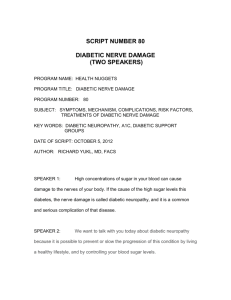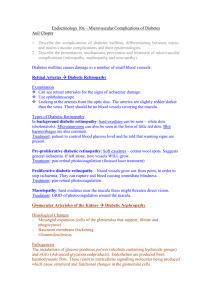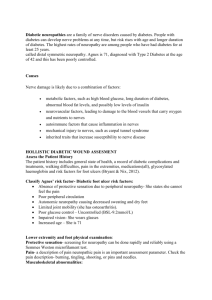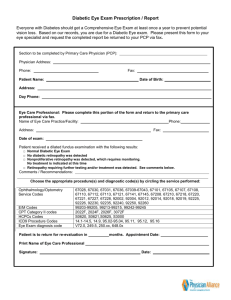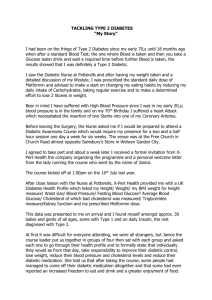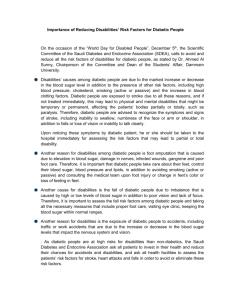script number 80 diabetic nerve damage (one speaker)
advertisement
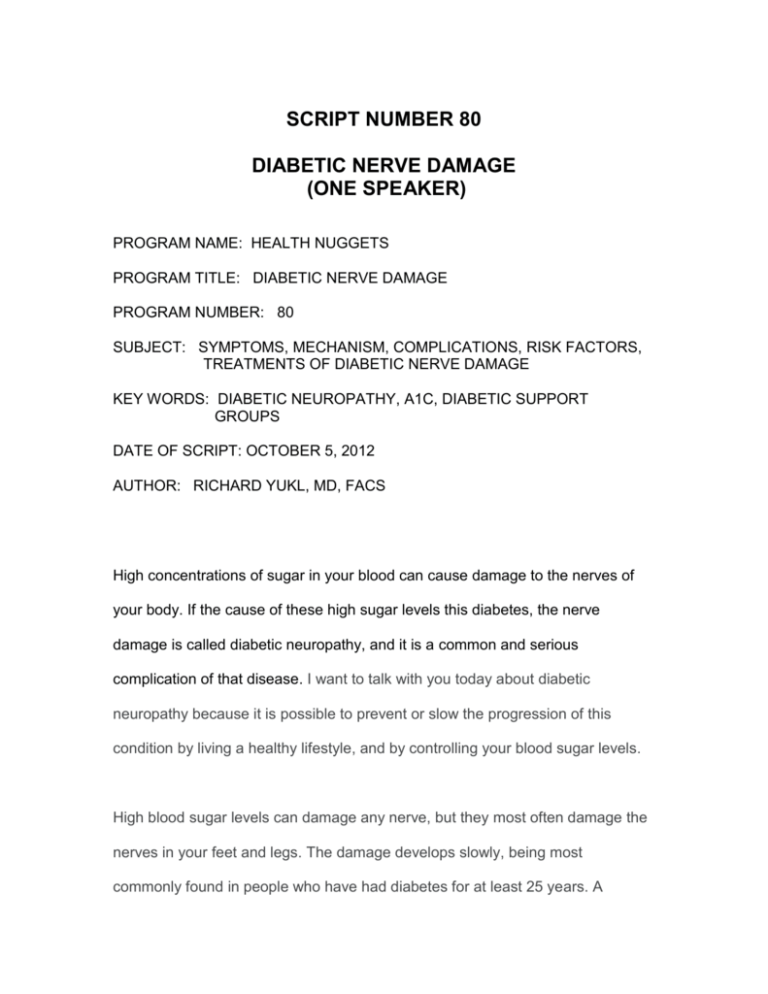
SCRIPT NUMBER 80 DIABETIC NERVE DAMAGE (ONE SPEAKER) PROGRAM NAME: HEALTH NUGGETS PROGRAM TITLE: DIABETIC NERVE DAMAGE PROGRAM NUMBER: 80 SUBJECT: SYMPTOMS, MECHANISM, COMPLICATIONS, RISK FACTORS, TREATMENTS OF DIABETIC NERVE DAMAGE KEY WORDS: DIABETIC NEUROPATHY, A1C, DIABETIC SUPPORT GROUPS DATE OF SCRIPT: OCTOBER 5, 2012 AUTHOR: RICHARD YUKL, MD, FACS High concentrations of sugar in your blood can cause damage to the nerves of your body. If the cause of these high sugar levels this diabetes, the nerve damage is called diabetic neuropathy, and it is a common and serious complication of that disease. I want to talk with you today about diabetic neuropathy because it is possible to prevent or slow the progression of this condition by living a healthy lifestyle, and by controlling your blood sugar levels. High blood sugar levels can damage any nerve, but they most often damage the nerves in your feet and legs. The damage develops slowly, being most commonly found in people who have had diabetes for at least 25 years. A diabetic may not even notice problems until considerable damage has already been done. Symptoms, when they occur, include a feeling of tingling, burning, or a prickling sensation starting in your toes or the balls of the feet and spreading upward. There may also be numbness that prevents you from feeling cold, heat, or pain if you step on a foreign body such as a splinter. You may develop sharp, jabbing pains that worsen at night, muscle weakness and pain when walking, and serious foot problems such as infections and ulcers. Symptoms do not necessarily mean that permanent nerve damage has occurred, but they should warn you of your need of medical attention, because early treatment offers the best chance of relieving your symptoms and preventing complications. As an example, if you are a diabetic, a minor sore on your foot that doesn't heal can progress into an ulcer without treatment, and untreated foot ulcers may eventually require surgery or even the amputation of your foot. As another example, diabetic damage to the nerves that control your urinary bladder can prevent it from emptying completely, allowing bacteria to multiply and a urinary tract infection to develop. The mechanism by which high blood sugar levels damage nerves isn't completely understood, but it probably involves a combination of factors. We know that there is a complex interaction between blood vessels and nerves, and that high blood sugar levels damage the walls of the small blood vessels that supply oxygen and nutrients to your nerves. Sugar also interferes with the ability of your nerves to send electrical signals in the way they were created to function. Poor control of blood sugar levels is by far the greatest risk factor for developing diabetic nerve damage. Keeping the levels within a safe target range is the best way to protect the health of both your blood vessels and your nerves. Smoking is another risk factor. Tobacco contains nicotine, which narrows and hardens your arteries, reducing blood flow to your legs and feet, and to the nerves that control them. Drinking alcohol is yet another risk factor for diabetic nerve damage. Alcohol acts directly as a poison to nerves. Additionally, people who drink heavily frequently suffer poor nutrition. They don’t eat the vitamins and nutrients their nerves need to stay healthy. Diabetic nerve damage has no known cure. Treatments focus on controlling the diabetes to slow progression of nerve damage, relieving the symptoms, and on managing the complications to restore function. Let us look at how you, as a diabetic, can control your level of blood sugar. It is a big commitment. Constant monitoring and frequent insulin injections or by mouth medications are required to keep your blood sugar at a safe level of 70 to 130 mg/deciliter before meals. Your doctor will instruct you on both the proper diet to follow and the exact amount of insulin you require to stay in this safe range. Modern labs have recently developed a test called an A1C. It helps in monitoring the success of your diabetic management by measuring your average blood sugar level over a period of 2-3 months. Your diabetes is controlled if your level is less than 7 percent. Blood pressure control is another effective diabetes treatment. A diabetic should keep their blood pressure less than 130/80 millimeters of mercury. You may require blood pressure medicines to achieve optimal blood pressure control. Next, eating a balanced diet that includes a variety of healthy fruits, vegetables and whole grains, and one that limits your portion size is an effective diabetes treatment. It helps you achieve and maintain a healthy weight. Being active every day will help you to effectively manage your diabetes by helping you to maintain a healthy weight, and to keep your blood sugar and blood pressure under control. You should aim for about 30 minutes of moderate exercise at least five times a week. Finally, the use of tobacco in any form by a diabetic increases their risk of dying from a heart attack or a stroke as compared with a non-smoking diabetic. It also makes you more likely to develop circulation problems in your feet. So, if you are a diabetic who smokes, stop. All of these diabetes treatments - keeping your blood sugar and blood pressure under control, following a healthy diet and getting physical exercise, avoiding alcohol and smoking - may seem bothersome, but they do help slow diabetic nerve damage, and failure to follow such precautions can be damaging to your health or even your life. Living with diabetic nerve damage can be stressful and frustrating because there are often no outward signs, making it difficult for others to understand your condition. Some people find that diabetes support groups are helpful because there you can talk to others who truly understand what you're going through. Members of support groups can offer you encouragement as well as advice about living with diabetic nerve damage. Ask your doctor for information about support groups in your area. Health Nuggets is written by Dr. Richard Yukl, a medical doctor working in the United States. The medical views expressed in this program are his and may differ for your particular health needs. If you need medical advice, please consult a medical professional in your area.
